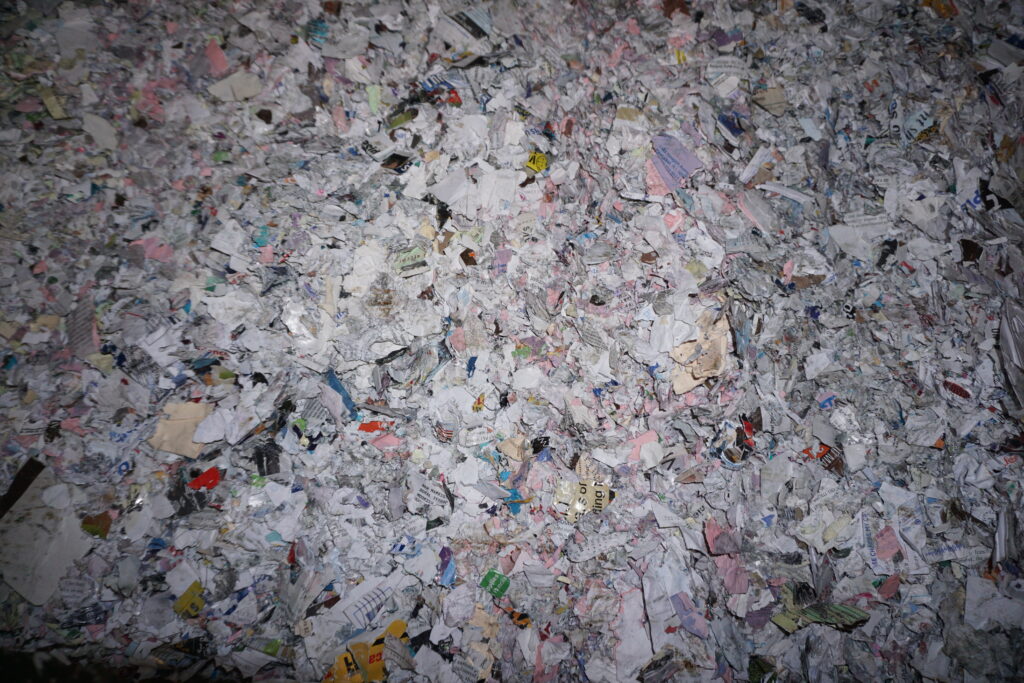
You’re keeping a lot of plates spinning as a business owner or busy professional. There’s never enough time to get everything done. So wouldn’t it make your life just a little bit easier if you could skip using a document shredding service, and just recycle or even throw away all your documents instead? Hackers aren’t a threat with paper files, and it’s not like there are burglars in ski masks pawing through your recycling bins overnight (probably).
In reality, document data security breaches can happen in very ordinary and preventable ways. A new employee could snag a copy of a customer’s payment information from an open recycling bin and pass it off to a friend who then tries to make purchases on the customer’s credit card. Or, if your company doesn’t have a strict shredding policy, employees who take work home might be lax about disposing of sensitive files. Using a document shredding service allows you to strictly control what happens to all the data that your company is responsible for protecting.
When to Use a Document Shredding Service
Businesses work with document shredding services to meet a variety of needs. Your company may schedule routine pickups for all of its sensitive documents, or arrange pickup on an as-needed basis. A document shredding service will generally provide secure containers to keep in your offices, protecting your documents until they’re collected for shredding. Then, when pickup is scheduled, the shredding service transfers your documents into a locked truck and takes them to its facility for shredding. (Your document shredding service may also be able to pick up hard drives, old samples, off-spec products and other data-storing or proprietary items that need to be shredded.) Or, your company may be able to drop off its materials to the shredding company.
In addition to routine shredding, businesses work with document shredding services when they’re cleaning out their offices, dealing with the impact of a flood or fire, or preparing to shut down. A closing business is still responsible for what happens to the sensitive data it has about customers and employees. Plus, there’s a ton of obsolete paper to deal with when a business shutters. After pulling out tax documents, payroll files and other things that need to be kept after the business closes, bringing in a shredding service makes it quick to securely dispose of everything else.
If you’re still thinking that it might be easier to just take your chances with the recycling bin, consider this: Working with a document shredding service to permanently destroy sensitive data may actually be a compliance requirement, depending on state laws and industry-specific regulations. Businesses in healthcare and financial services have to be especially diligent around data security and document shredding—but even a pet food store, yoga studio or other kind of business may be subject to state laws around data protection.
In Massachusetts, 201 CMR 17 created a legal standard for the protection of residents’ personal information. If your business has any files that contain a Massachusetts resident’s first name/first initial and last name, plus that person’s state-issued ID number, Social Security number or financial account number, you’re legally required to keep those files secure at all times. Putting a document with a client’s payment information in a curbside recycling bin could constitute noncompliance, since you can no longer control who accesses that document.
When Not to Use a Document Shredding Service
Not every piece of paper that your business disposes of needs to be shredded. You probably have a lot of office clutter that’s not personalized to your business or your clients. Think old paperback training manuals, phone books, instruction manuals for office equipment and magazines or other publications. These kinds of things can be recycled along with your cardboard and other recyclable materials.
As you think about what kinds of things need to be shredded vs. recycled, err on the safe side by shredding any document that contains any piece of private information about a person or entity. If necessary, ask yourself: Is there any information contained here that we wouldn’t want a random person to access? An industry journal with your business’s address on the label can be recycled – since your address is already public – while an old invoice with a client’s contact information or an internal document that addresses intellectual property should always be shredded.
Sure, it’s highly unlikely that anything would come of recycling these kinds of documents instead of shredding them. But the risks associated with a data breach are too big for you to take any chances with data security. Shredding most or all of your business’s documents is advisable. When companies ask, our guidance is to shred everything so you never have to worry who used the backside of a document to scribble down a note about a client or what document got inadvertently mixed in with the junk mail headed for recycling.
Partnering with a document shredding service is also something you can point to when marketing your business as a security-conscious solution for your clients’ needs. Most professionals are concerned about data security these days. If a prospective client asks about how you protect client security, you’ll be able to name the shredding company that you use and talk about your processes for shredding both paper documents and hard drives.
Northeast Data Destruction works with businesses across all industries, providing routine shredding services and working with businesses as they prepare to move or shut down. From a single box to a full truckload, we’re equipped to securely transport and destroy whatever your company needs shredded. If you have questions, contact me today!
